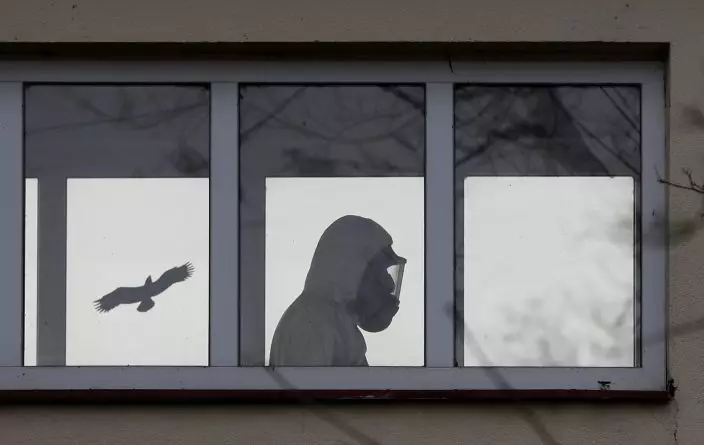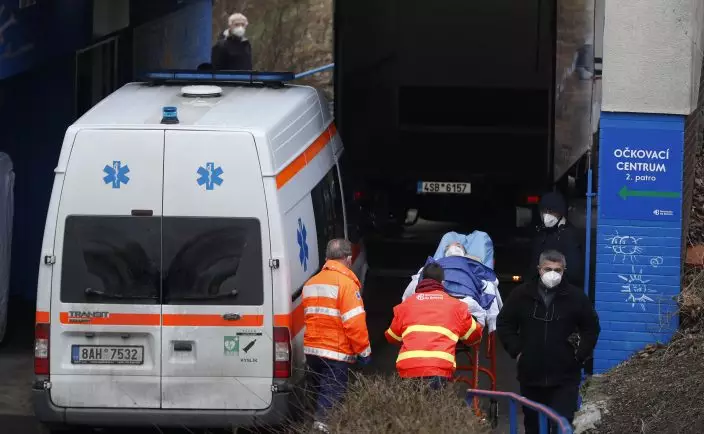With new infections soaring due to a highly contagious coronavirus variant and hospitals filling up, one of the hardest-hit countries in the European Union is facing the inevitable: a tighter lockdown.
The Czech Republic’s Prime Minister Andrej Babis has announced a plan to “radically” limit free movement of the citizens and further measures, including the closure of nursery schools and schools for children with disabilities that until now have remained open.
“We need to limit movement for three weeks because the new variants are more aggressive,” Babis said Thursday night. “We can see a dramatic increase of patients in hospitals.”

An healthcare worker walks at the infectious ward of the Bulovka hospital in Prague, Czech Republic, Wednesday, Feb. 24, 2021. The Czech prime minister Andrej Babis said the pandemic situation in one of the hardest-hit country in the European Union, is "extremely serious" and his government will have to impose more restrictive measures to slow down the spread of the coronavirus. (AP PhotoPetr David Josek)
The government is set to announce the details of the new lockdown on Friday. The minority Cabinet first wants to win support from the opposition to extend the state of emergency, a powerful tool that makes it possible to limit people’s travel and other basic rights.
Another option is to declare a new state of emergency after the current one expires on Sunday. A vote in Parliament’s lower house is expected Friday.
“It’s not the best timing, it is in fact late,” Jan Konvalinka, a biochemist and vice-rector of Prague’s Charles University, told Czech public radio. “But better late than never, we have to stop it somehow.”

Healthcare workers move a patient to the infectious ward of the Bulovka hospital in Prague, Czech Republic, Wednesday, Feb. 24, 2021. The Czech prime minister Andrej Babis said the pandemic situation in one of the hardest-hit country in the European Union, is "extremely serious" and his government will have to impose more restrictive measures to slow down the spread of the coronavirus. (AP PhotoPetr David Josek)
Konvalinka is a member of a group of scientists who have urged the government to immediately apply strict restrictions to reduce the number of new daily infections to 1,000 confirmed cases. It was 14,457 on Thursday, some 2,750 more than a week earlier.
Amid a surge of the variant first identified in the U.K., of the 7,176 COVID-19 patients in Czech hospitals on Thursday, a record 1,531 needed intensive care.
Another potentially dangerous variant first detected in South Africa has also been confirmed in the country.
To help the struggling health system and prevent a collapse, the government has been discussing with Germany and Poland an option to send Czech COVID-19 patients to their hospitals for treatment as the local clinics are reaching their limits.
The seven-day rolling average of daily new cases has risen over the past two weeks from 68.83 new cases per 100,000 people on Feb. 11 to 99.94 on Thursday, the worst per-capita rate in the world, according to Johns Hopkins University.
The nation of 10.7 million has had over 1.2 million confirmed cases with almost 20,000 deaths.
In an attempt to boost the vaccination program, the Czech Republic has approached EU nations and others asking them for vaccines for which they don’t have immediate use.
Babis said France has agreed to send 100,000 doses by the middle of March. Some 5,000 Moderna doses have been donated by Israel, a close ally.
The Czechs had administered 623,820 shots by Thursday.
The government is planning to require mass self-testing of employees in companies and extend the required quarantine from 10 to 14 days to address the specifics of the new variants.
Follow all of AP’s pandemic coverage at https://apnews.com/hub/coronavirus-pandemic, https://apnews.com/hub/coronavirus-vaccine and https://apnews.com/UnderstandingtheOutbreak


